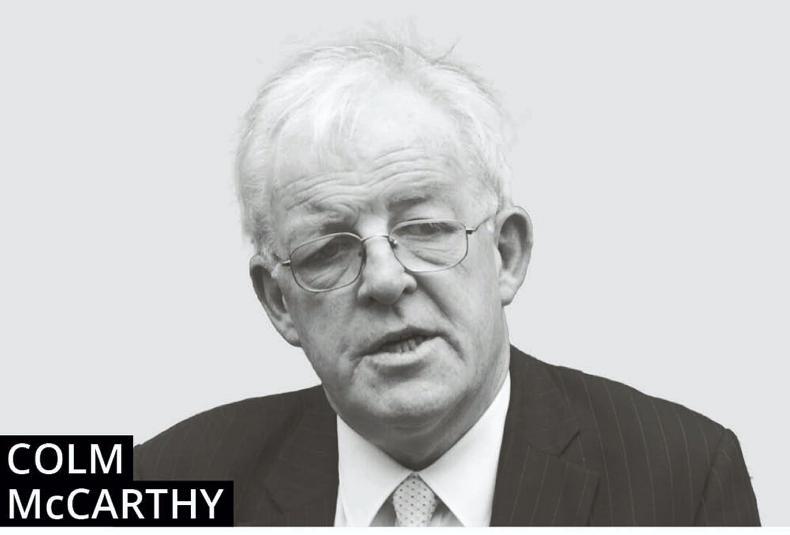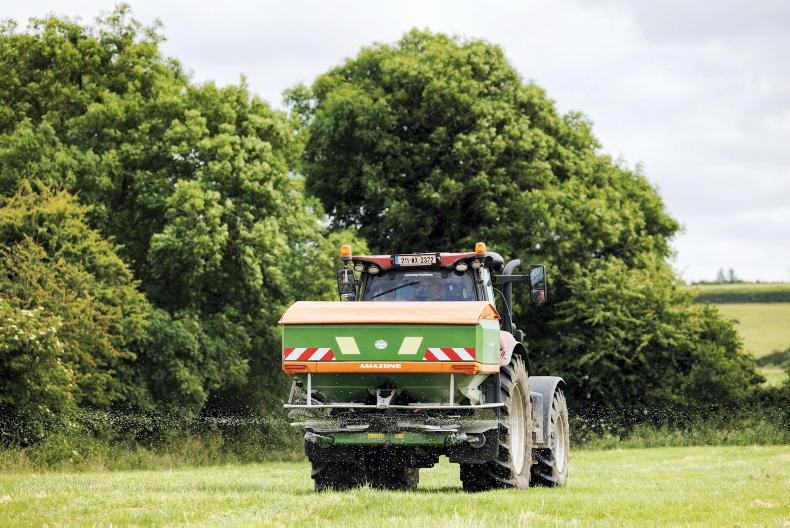The current agitation about the viability of beef production was caused by the proposed EU trade agreement with the Mercosur countries, including Brazil. Since the draft agreement was announced, the Brazilian government has faced an intense reaction to the dramatic fires, some of them started deliberately, sweeping through Amazonia.
The deal may never happen for this reason alone and the unexpected turn of events illustrates a fundamental reality for livestock farming.
Climate change is the critical strategic issue and the ICMSA event yesterday at the Louis Fitzgerald hotel on the Naas Road in Dublin was a timely response.
There is already a consumer trend moving away from animal products in some countries
Land use for food production has a major impact on worldwide carbon emissions and using land for livestock farming is becoming a central issue.
There is already a consumer trend moving away from animal products in some countries as citizens, impatient with sluggish government responses, take whatever action they can in their own lives.
EU climate policy
Some people have been cutting down on air travel in recent times, obsessing about air-miles and conscious that air transport generates carbon emissions.
A policy response regarding air travel has emerged which should be of interest to other sectors, like farming, which are also in the firing line.
Air travel has led a charmed life down the years, with zero taxes on jet kerosene and exemption from consumer taxes like VAT.
If jet fuel paid the kind of carbon levy imposed on auto fuel in Ireland as well as VAT at the standard rate, ticket prices would rise by about 33% and carbon emissions from the sector would fall dramatically.
The initiative on aviation is an important departure
The European Union has begun consideration of a demand-side policy along these exact lines and is clearly unimpressed with the industry-led efforts to contain emissions from aviation.
EU climate policy has been built around national production-based emission targets, known as the Kyoto approach, which has failed internationally for over 20 years.
The initiative on aviation is an important departure.
With livestock farming, the current tendency is to consider the issue in the framework of territorial, producer-side emission measurements, which point to herd-size limitations and a return to quotas.
This is not in the interest of the most efficient producers, especially those most able to contain carbon emissions per unit of output.
Saudi Arabia is not held responsible for carbon emissions from Saudi oil products consumed in Ireland
The most efficient producer should favour demand-side measures, such as consumer taxes, rather than the political distribution of output limits, which will inevitably allocate too much quota in the wrong places.
Saudi Arabia is not held responsible for carbon emissions from Saudi oil products consumed in Ireland. But Ireland would suffer if herd-size limitations were to be imposed on Irish dairying, since the associated emissions are counted on a territorial, production-side basis.
Economists have been pointing out this inconsistency for decades to no apparent effect, but the debate may finally be shifting. Consumption of auto fuels in Europe is contained by taxation policies at the consumer end; Europeans drive smaller cars and notch up lower annual mileage than those in the USA, where taxes are much lower. It is not contained by arbitrary production limits on Saudi Arabia the world’s lowest-cost oil producer.
Demand-side production
If European policy results in national herd-size limits, this makes as much sense as allocating a portion of Saudi Arabia’s oil production to countries where oil can be recovered offshore only at extravagant cost. The significance of the reconsideration of aviation taxes is that the alternative is obviously too ridiculous.
If it makes no sense to tell each airline to cull its fleet of airplanes, why should national governments be expected to limit herd sizes, especially in exporting countries where production is carbon efficient?
It will be many years before a coherent international response to the climate challenge takes shape. Greta Thunberg’s trip by yacht to New York is not an example the rest of us can follow, but it will spur governments to think about demand-side measures in aviation, just as the consumer trend in food consumption away from animal products will evoke a political response.
As an exporter of livestock products, Ireland has much to lose if the EU persists with territorial, production-based emission limits
It has been the conviction of many observers that a coalition of the USA, China and the EU is neccessary in order to meet the global climate challenge with a global response.
The EU, which has demonstrated the most active policy, will be critical whenever this happens. As an exporter of livestock products, Ireland has much to lose if the EU persists with territorial, production-based emission limits.
This is especially the case if the scientific evidence backs up, as it appears to do, the contention that the carbon emissions associated with the production of dairy products in Ireland are lower than in many competitor countries.
Ireland should be supporting the shift in policy from the production to the demand side – sometimes you must believe your own publicity.
Read more
Climate change: longer-term thinking needed
Credible leadership needed to meet climate target – IFA
The current agitation about the viability of beef production was caused by the proposed EU trade agreement with the Mercosur countries, including Brazil. Since the draft agreement was announced, the Brazilian government has faced an intense reaction to the dramatic fires, some of them started deliberately, sweeping through Amazonia.
The deal may never happen for this reason alone and the unexpected turn of events illustrates a fundamental reality for livestock farming.
Climate change is the critical strategic issue and the ICMSA event yesterday at the Louis Fitzgerald hotel on the Naas Road in Dublin was a timely response.
There is already a consumer trend moving away from animal products in some countries
Land use for food production has a major impact on worldwide carbon emissions and using land for livestock farming is becoming a central issue.
There is already a consumer trend moving away from animal products in some countries as citizens, impatient with sluggish government responses, take whatever action they can in their own lives.
EU climate policy
Some people have been cutting down on air travel in recent times, obsessing about air-miles and conscious that air transport generates carbon emissions.
A policy response regarding air travel has emerged which should be of interest to other sectors, like farming, which are also in the firing line.
Air travel has led a charmed life down the years, with zero taxes on jet kerosene and exemption from consumer taxes like VAT.
If jet fuel paid the kind of carbon levy imposed on auto fuel in Ireland as well as VAT at the standard rate, ticket prices would rise by about 33% and carbon emissions from the sector would fall dramatically.
The initiative on aviation is an important departure
The European Union has begun consideration of a demand-side policy along these exact lines and is clearly unimpressed with the industry-led efforts to contain emissions from aviation.
EU climate policy has been built around national production-based emission targets, known as the Kyoto approach, which has failed internationally for over 20 years.
The initiative on aviation is an important departure.
With livestock farming, the current tendency is to consider the issue in the framework of territorial, producer-side emission measurements, which point to herd-size limitations and a return to quotas.
This is not in the interest of the most efficient producers, especially those most able to contain carbon emissions per unit of output.
Saudi Arabia is not held responsible for carbon emissions from Saudi oil products consumed in Ireland
The most efficient producer should favour demand-side measures, such as consumer taxes, rather than the political distribution of output limits, which will inevitably allocate too much quota in the wrong places.
Saudi Arabia is not held responsible for carbon emissions from Saudi oil products consumed in Ireland. But Ireland would suffer if herd-size limitations were to be imposed on Irish dairying, since the associated emissions are counted on a territorial, production-side basis.
Economists have been pointing out this inconsistency for decades to no apparent effect, but the debate may finally be shifting. Consumption of auto fuels in Europe is contained by taxation policies at the consumer end; Europeans drive smaller cars and notch up lower annual mileage than those in the USA, where taxes are much lower. It is not contained by arbitrary production limits on Saudi Arabia the world’s lowest-cost oil producer.
Demand-side production
If European policy results in national herd-size limits, this makes as much sense as allocating a portion of Saudi Arabia’s oil production to countries where oil can be recovered offshore only at extravagant cost. The significance of the reconsideration of aviation taxes is that the alternative is obviously too ridiculous.
If it makes no sense to tell each airline to cull its fleet of airplanes, why should national governments be expected to limit herd sizes, especially in exporting countries where production is carbon efficient?
It will be many years before a coherent international response to the climate challenge takes shape. Greta Thunberg’s trip by yacht to New York is not an example the rest of us can follow, but it will spur governments to think about demand-side measures in aviation, just as the consumer trend in food consumption away from animal products will evoke a political response.
As an exporter of livestock products, Ireland has much to lose if the EU persists with territorial, production-based emission limits
It has been the conviction of many observers that a coalition of the USA, China and the EU is neccessary in order to meet the global climate challenge with a global response.
The EU, which has demonstrated the most active policy, will be critical whenever this happens. As an exporter of livestock products, Ireland has much to lose if the EU persists with territorial, production-based emission limits.
This is especially the case if the scientific evidence backs up, as it appears to do, the contention that the carbon emissions associated with the production of dairy products in Ireland are lower than in many competitor countries.
Ireland should be supporting the shift in policy from the production to the demand side – sometimes you must believe your own publicity.
Read more
Climate change: longer-term thinking needed
Credible leadership needed to meet climate target – IFA








SHARING OPTIONS